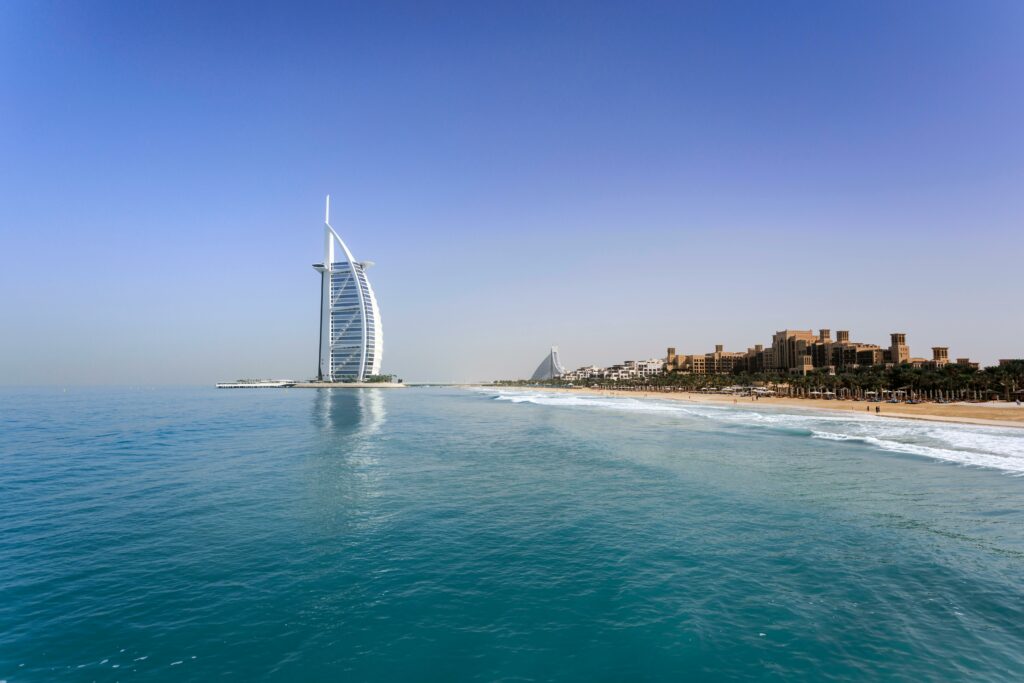![]()
The United Arab Emirates (UAE) is a federation of seven emirates located on the southeastern coast of the Arabian Peninsula, in the Persian Gulf. Since its formation in 1971, the UAE has experienced rapid and spectacular development, becoming one of the most advanced and diversified economies in the Middle East. This article explores the evolution of the UAE, its current situation, and the impact of its development model.
Economic and social developments in the United Arab Emirates
The United Arab Emirates has long been associated with oil resources, but the country has diversified economically in recent decades. While oil reserves remain a major source of revenue, the UAE has developed sectors such as finance, trade, tourism, construction and technology.
- Economic growth : The development of modern infrastructure and free zones, such as those in Dubai, has enabled the UAE to position itself as a regional and international hub for business and trade. The country has invested in ambitious projects, such as the Burj Khalifa, the world’s tallest skyscraper, and the Palm Jumeirah, a famous artificial island.
- Economic Diversification : Through the “Vision 2021” initiative and other long-term development plans, the UAE has focused on diversification to reduce its dependence on oil. Significant investments have been made in the renewable energy, finance, technology and transportation sectors. Dubai, in particular, has become a global financial center and a leading tourist destination.
- Energy sector : Although oil continues to play a central role, the UAE has also invested in renewable energy, with flagship projects such as the Mohammed bin Rashid Al Maktoum solar plant in Dubai and the Barakah plant in Abu Dhabi, which marks the country’s entry into civil nuclear power.
Education and health: Modernization and access to quality services
The Emirates have also invested heavily in education and health, to support the growth of a modern, well-educated society.
- Education : The country is focusing on improving its education systems, with world-class schools and prestigious universities, including Paris-Sorbonne in Abu Dhabi and New York University in Abu Dhabi. The government is also encouraging young people to pursue studies in technical and scientific fields, to support the transition to a knowledge-based economy.
- Health : The UAE’s healthcare system has been modernized, with the construction of high-quality medical centers. Healthcare is widely accessible, including for expatriates, and the country is increasingly attracting international patients due to the quality of its treatments, particularly in the areas of cosmetic surgery and specialized treatments.
Social and geopolitical challenges
Despite its economic successes, the Emirates face certain social and geopolitical challenges:
- Labour Rights and Inequality : Migrant workers represent a significant proportion of the workforce, particularly in the construction and service sectors. The working conditions of some of these workers, mainly from South Asia, have drawn international criticism. The authorities have taken steps to improve the situation, but challenges remain in terms of labour rights and social inequalities.
- Human Rights and Freedoms : The UAE government is an authoritarian regime, with restrictions on freedom of speech and the press. Criticism of the government or policies may be repressed, and political rights are limited. However, the country has made progress in some areas, such as combating domestic violence and achieving gender equality in some professions.
- Geopolitics : Due to its strategic position, the UAE is a key player in Gulf geopolitical affairs. It has played an important role in the coalition against terrorism and established diplomatic relations with Israel in 2020, which marked a turning point in regional politics.
The Human Development Index (HDI) of the United Arab Emirates
The UAE’s HDI is among the highest in the region, ranking the country in the “very high human development” category. This index is a reflection of massive investments in social infrastructure, education, health and quality of life. Life expectancy is high, literacy is almost universal and access to healthcare is top-notch.
Conclusion
The United Arab Emirates has successfully transformed itself from a small, oil-rich state to a modern, diverse nation with advanced infrastructure and impressive human development. However, the country continues to face challenges, particularly in the areas of human rights and social justice. The UAE’s future will depend on its ability to maintain growth while addressing these challenges.

